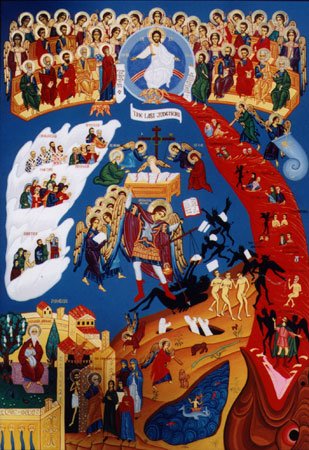 On this next to last weekend before the beginning of the Great Fast, we hear St. Paul exhort us to not scandalize our fellowmen and Luke share with us a picture of what is called the Last Judgment. I would focus, in my comments, on Luke’s Gospel.
On this next to last weekend before the beginning of the Great Fast, we hear St. Paul exhort us to not scandalize our fellowmen and Luke share with us a picture of what is called the Last Judgment. I would focus, in my comments, on Luke’s Gospel.
This particular chapter in Luke’s Gospel, in its present form, has been produced by ecclesiastical expansions of the sayings of Jesus. The usual designation of the passage as “the Last Judgment” is somewhat misleading; it is an imaginative scene in which is set the core of the more teaching of Jesus. It has no parallel in the other Gospels. The scene is the parousia, and “all nations” mean all mankind. But the process is addressed to the disciples; the standards on which they will be judged are set forth. That faith is not mentioned should lead to no theological conclusions; it is clear that for Matthew as for other New Testament writers, faith in Jesus is the first movement of man toward God. The point of this scene is that faith is not the whole movement; that it should transform the disciple.
Christ did not leave with his disciples a doctrine of individual salvation but a new commandment that they must love one another. To this Jesus added, “By this shall all know that you are my disciples if you love one another”. Love, thus is the foundation, the very life of the Church which is, in the words of St. Ignatius of Antioch, “unity of faith and love.”
So this Gospel passage is not really about God, in the Person of Jesus, judging those at the end of time but, rather, a presentation of the basic core message of Jesus. To be His disciple, we must attempt to develop unconditional love for all others, regardless of their response to us. This is a very important point. During this lifetime we must learn how to be authentic humans, imitating Jesus, and not allowing the behavior of others determine the way that we freely choose to live. The Christian way of living is one of true, personal transformation.
We use the teachings of Jesus to determine and govern our behaviors and attitudes. We do not depend upon our society to determine how we will live but, rather, we commit ourselves to living like Jesus did and to grow in our likeness of God as expressed in the human person of Jesus.
We are called to embrace and hold sacred the values about life that Jesus expressed through the way He treated other people. We no longer embrace the idea of an “eye for an eye and a tooth for a tooth.”
To be a true Christian means to be “confident” that the way we choose to live is the right way. The right way to live is the way that God intended us humans to live in order to spiritually grow. What is better, to be accepted by God or by your fellowmen? I guess that I would rather be accepted by God than by other humans.
